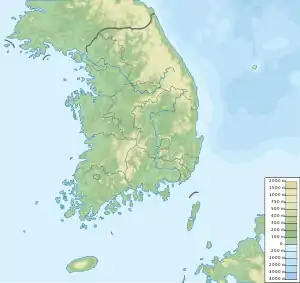| Hasandong Formation | |
|---|---|
| Stratigraphic range: Aptian-Albian ~ | |
| Type | Geological formation |
| Unit of | Shindong Group |
| Underlies | Jinju Formation |
| Overlies | Nakdong Formation |
| Thickness | 1200 metres |
| Lithology | |
| Primary | Mudstone |
| Other | Shale, sandstone |
| Location | |
| Coordinates | 35°06′N 128°00′E / 35.1°N 128.0°E |
| Approximate paleocoordinates | 41°18′N 128°06′E / 41.3°N 128.1°E |
| Region | North Gyeongsang Province |
| Country | |
 Hasandong Formation (South Korea) | |
The Hasandong Formation (Korean: 하산동층; Hanja: 霞山洞層; RR: Hasandong-cheung) is an Early Cretaceous (Aptian to Albian) geologic formation in South Korea. It has been dated to the late Aptian and earliest Albian, between 118.0 ± 2.6 Ma and 112.4 ± 1.3 Ma.[1] Dinosaur remains diagnostic to the genus level are among the fossils that have been recovered from the formation.[2] Tracks of the pterosaur ichnospecies Pteraichnus koreanensis have also been recovered from the unit.[3]
Fossil content
Paleofauna
- Hadongsuchus acerdentis[4] - nomen nudum
- Tyrannosauroidea indet.[5] - "Tooth."
- Carcharodontosauridae indet.[6] - "Several teeth remains."
- Titanosauriformes indet. -"Several teeth remains."[7]
- Pukyongosaurus milleniumi - "Cervical and dorsal vertebrae, ribs, limb and girdle elements."[8][9]
- Hadrosauroidea indet. - "Tooth."
- Pterodactyloidea indet. (belongs to either Boreopteridae or Anhanguerian)[10][11]
- Boreopteridae indet.
- Dsungaripteridae indet.[12]
- Sinamia sp.[13]
- Proadocus hadongensis - a turtle[14]
- Sauripes hadongensis - an ichnotaxon (the oldest lizard trackway; shows bipedalism)[15]
- Pteraichnus koreanensis - pterosaur ichnotaxon[3]
- Testudoolithus aff. curiosa - turtle ootaxon[16]
Paleoflora[17]
- Thallites (T. yabei) - liverworts
- Onychiopsis (O. elongata) - leptosporangiate ferns
- Cladophlebis (C. denticulata, C. shinshuensis, C./Eboracia? lobifolia and C./Klukia? koraiensis)
- Brachyphyllum (B. japonicum)
- Elatocladus (E. tennerima)
- Taeniopteris (T.? sp. and cf. T. auriculata) - cycad ferns
See also
References
- ↑ Lee, Tae-Ho; Park, Kye-Hun; Yi, Keewook (October 2018). "Nature and evolution of the Cretaceous basins in the eastern margin of Eurasia: A case study of the Gyeongsang Basin, SE Korea". Journal of Asian Earth Sciences. 166: 19–31. Bibcode:2018JAESc.166...19L. doi:10.1016/j.jseaes.2018.07.004. S2CID 135061525.
- ↑ Weishampel, David B.; Barrett, Paul M.; Coria, Rodolfo A.; Le Loueff, Jean; Xu, Xing; Zhao, Xijin; Sahni, Ashok; Gomani, Emily M.P.; Noto, Christopher N. (2004). "Dinosaur distribution". In Weishampel, David B.; Dodson, Peter; Osmólska, Halszka (eds.). The Dinosauria (Second ed.). Berkeley: University of California Press. pp. 517–607. ISBN 978-0-520-24209-8.
- 1 2 Y.-N. Lee, H.-J. Lee, J. and Y. Kobayashi. 2008. New pterosaur tracks from the Hasandong Formation (Lower Cretaceous) of Hadong County, South Korea. Cretaceous Research 29:345-353.
- ↑ Lee, H.-J. and Lee, Y.-N., 2005, A new protosuchian (Archosauria: Crocodyliformes) skull from the Hasandong Formation (Lower Cretaceous) of Hadong County, South Korea. Journal of Vertebrate Paleontology, 25 (Supplement to Number 3), 83A
- ↑ Lee, Yuong-Nam (2008-03-01). "The first tyrannosauroid tooth from Korea". Geosciences Journal. 12 (1): 19–24. doi:10.1007/s12303-008-0003-z. ISSN 1598-7477.
- ↑ Yun, Chan-gyu (2020-06-02). "A Carcharodontosaurid tooth from the Hasandong Formation (Lower Cretaceous) of South Korea". Mongolian Geoscientist. 50: 2–10. doi:10.5564/mgs.v50i0.1325. ISSN 2663-5151.
- ↑ Choi, Seung; Lee, Yuong-Nam (2017-12-01). "A review of vertebrate body fossils from the Korean Peninsula and perspectives". Geosciences Journal. 21 (6): 867–889. doi:10.1007/s12303-017-0040-6. ISSN 1598-7477.
- ↑ "Table 13.1," in Weishampel, et al. (2004). Page 271.
- ↑ Z. Dong, I. S. Paik, and H. J. Kim. 2001. A preliminary report on a sauropod from the Hasandong Formation (Lower Cretaceous), Korea. In T. Deng, Y. Wang (eds.), Proceedings of the Eighth Annual Meeting of the Chinese Society of Vertebrate Paleontology 41-53.
- ↑ Park, J.-Y.; Lee, S.; Kim, S.-H.; Son, M.; Lee, Y.-N. (2020). "A pterosaur wing phalanx from the Lower Cretaceous Hasandong Formation of Hadong-gun, Gyeongsangnam-do, South Korea" 경상남도 하동군 하부 백악기 하산동층에서 산출된 익룡 지골 화석 [A pterosaur wing phalanx from the Lower Cretaceous Hasandong Formation of Hadong-gun, Gyeongsangnam-do, South Korea] (PDF). Journal of the Geological Society of Korea. 56 (1): 77–84. doi:10.14770/jgsk.2020.56.1.77. S2CID 216159474.
- ↑ Yun, Chan-Gyu (2020). "Boreopterid pterosaur fossils from South Korea reconsidered". New Mexico Museum of Natural History and Science Bulletin. 82: 567–568.
- ↑ Lim, Jong-Deock; Baek, Kwang-Seok; Yang, Seung Young (2002). "A new record of a pterosaur from the Early Cretaceous of Korea". Current Science. 82 (10): 1208–1210. JSTOR 24107042.
- ↑ Yabumoto, Y.; Yang, S.Y.; Kim, T.W. (2006). "Early Cretaceous freshwater fishes from Japan and Korea" (PDF). Journal of the Paleontological Society of Korea. 22 (1): 119–132.
- ↑ Kim, D. H.; Lee, Y.-N.; Ko, H.; Park, J.-Y.; Kim, S.-H.; Lee, S.; Jung, S.-H.; Kong, D.-Y. (2023). "The first adocid turtle in South Korea (Lower Cretaceous) and the early evolution of the Adocidae". Cretaceous Research. 105665. doi:10.1016/j.cretres.2023.105665.
- ↑ Lee, H.J.; Lee, Y.N.; Fiorillo, A.R.; Lü, J. (2018). "Lizards ran bipedally 110 million years ago". Scientific Reports. 8 (1): 2617. Bibcode:2018NatSR...8.2617L. doi:10.1038/s41598-018-20809-z. PMC 5814403. PMID 29449576.
- ↑ Choi, S.; Kim, H.; Paik, I.; Park, Y.; Jung, H.; Xu, X. (2023). "Turtle eggs from the Lower Cretaceous Hasandong Formation (South Korea) with relict aragonite under significant thermal maturity". Journal of Vertebrate Paleontology. 42 (4). e2183866. doi:10.1080/02724634.2023.2183866.
- ↑ Kim, Jong-Heon; Nam, Kye-Soo; Lee, Seong-Bok; Jeon, Yeong-Seok (2016). "Fossil Plants from the Early Cretaceous Hasandong Formation of Chilgok Area, Korea" (PDF). Journal of the Korean Earth Science Society. 37 (5): 295−308. doi:10.5467/JKESS.2016.37.5.295.
Bibliography
- Weishampel, David B.; Peter Dodson, and Halszka Osmólska (eds.). 2004. The Dinosauria, 2nd edition, 1–880. Berkeley: University of California Press. Accessed 2019-02-21. ISBN 0-520-24209-2
This article is issued from Wikipedia. The text is licensed under Creative Commons - Attribution - Sharealike. Additional terms may apply for the media files.